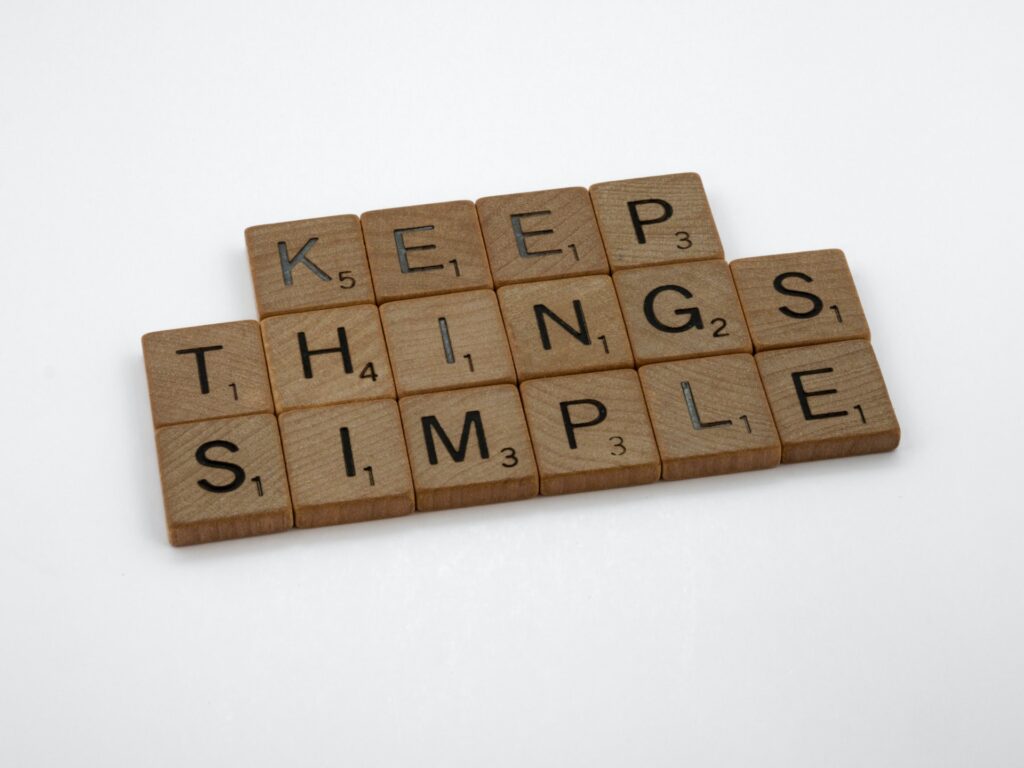What is Decision Fatigue?
Decision Fatigue is a psychological occurrence where a person’s ability or capacity to make decisions reduces from making too many decisions – large or small.
Why is combating Decision Fatigue important?
The bottom line is that Decision Fatigue can amount to additional stress, poor health and quality of life if you do not combat it.
I picked this topic because sometimes it’s easy to underestimate the number of decisions we make daily and the impact that it has on us. It’s easy to think that it’s only the big, important and stressful choices that drain us. I found myself getting very exhausted, quickly, even though it didn’t seem like I had made that many big decisions. But I make several, small, critical and non-critical decisions in my everyday life and these can stack up. Here are some signs I noticed when I had Decision Fatigue:
Avoiding making decisions entirely.
The ‘I’ll do it later’ approach.
This is often the worst-case scenario. But, if you become too tired to make decisions, this could lead to you easily putting off and avoiding things when you are overloaded. Especially if the decision load grows more and more throughout the day
It could be not going somewhere because there is too much choice. Say you want to go out for the day, but there are too many options, you become overwhelmed and eventually stay in.
Not responding to work emails or messages because you don’t have the energy to respond to a decision.
Or you decide not to exercise: Do I go for a run? Do I lift weights? I’m at the gym… But now what? I don’t know what to work on, do I work on my chest today? Cardio? I’ll just jog on the treadmill for a bit until I figure it out. Oh, there goes my time to exercise... I’ll go tomorrow instead.
And most importantly, you could neglect financial responsibilities. Not paying bills because you can’t decide which one to deal with first and putting them off. The result? You miss payments, the interest on your debts grows and becomes harder to cope with.
Settling for easier, default options.
You’re out with friends, it’s lunchtime, there isn’t a decision made yet about where to eat. You’re getting hangry (not hungry, hangry!). Everybody agrees on a fast-food chain with limited options for vegetarians and you’re a vegetarian…
Delegating decisions can be helpful under careful consideration. But not when it results in trading-off for easier decisions that may not have your best interests at heart. Imagine the restaurant example being a fancy, Michelin starred restaurant instead, perhaps far more expensive than what you budgeted for!
Making poor decisions such as:
- Impulsive spending.
- Picking junk food over healthier options.
- Picking a savings account with a lower interest rate or a credit card with higher interest repayments.
There’s so much choice out there in front of us in the world. Shops target Decision Fatigue with cleverly placed goods, catchy slogans and bright, colourful signs. I’ve been there, hungry at lunch, in a rush to get back to my desk on a busy day. What was supposed to be a well-intended, healthy, lunchtime salad soon gets accompanied by a chocolate bar because they were on sale by the checkout. Never apples or bananas, always that sweet, sweet processed, sugary goodness. When you are fatigued and under pressure, your ability to decide can go completely out of the window.
Regularly getting brain fog (mental fatigue) and feeling tired
Tiredness and fatigue may not always be down to Decision Fatigue so always check with a healthcare professional if you are concerned. But, if you are suffering from stress and fatigue, it’s definitely an area of your life worth investigating and improving. Mental tasks can exhaust us just as much as running a marathon at times and if you find yourself constantly making millions of decisions in a day, it’s no wonder you might be feeling wiped out.
Unfortunately, we do have to make decisions in our lives. Small ones and huge ones! Mortgages over rent? Do I pay this bill or the other one? Red sweater or blue sweater? An apple or a chocolate bar? Just imagining the extensive list of potential decisions is exhausting! And what we don’t want to happen is putting off making decisions. That could result in not seeing friends, paying bills, phoning the car insurance company for a better deal or, more importantly, settling on having a decision being made for us that doesn’t have our best interests in mind…
If you go in with a purpose, you can come out with what you need. But if you have burned out your decision-making ability, you’re more likely to grab a sugary snack for a quick-fix, surge of energy. Probably after that, you’ll be eyeing up your empty coffee mug again.

So, How Can You Combat Decision Fatigue?
1. Make big decisions when you have the most energy
2. Limit your options and make fewer choices
3. Give them to other people
4. Simplify!
5. Keep a schedule
6. Find a process that works for you
1. Make big decisions when you have the most energy
Firstly, for me, this is usually in the morning. Not just because it’s when I’m generally more switched on, but because it gives me time during the day to address any outcomes of those decisions at a peak time. If a decision I make in the morning has a consequence that comes back to me by the afternoon, I can plan and tackle it effectively. Making a big decision in the evening or at the end of the day when I am tired, may result in a poor decision choice with very little time left to deal with the consequences. It may also result in me ruminating/doubting the decision in the evening, subsequently affecting my sleep, which will have a knock-on effect to the next day and so on.
The other time I have more energy is when I have fuel! Food! Not just coffee fumes, but real, food energy. Making decisions when you’re hungry spells trouble, especially if they are food decisions. If my stomach’s rumbling and I have to decide whether to pull the plug on an operation or task – I’m not going to be thinking clearly about that. I’m going to be tired, hungry and lethargic which could lead to a rash decision just so I can make my next energy refuel.
2. Limit your options and make fewer choices
Seems simple, right? It doesn’t mean avoiding making decisions. It means with careful planning and preparation you can reduce the number of decisions you need to make or group them into a suitable time. For example:
Meal Planning
I have a rudimentary spreadsheet that I plan my weekly meals on in this article. There I link to new recipes, write down what the meal is, list the ingredients and so on. I try to plan for a week or two weeks in advance. 20 minutes of planning – or even better, adding a meal idea when it comes to mind – saves so much decision making power later. It means that when I get to the supermarket to buy groceries I have a list ready to go. There’s no don’t need to sit down and write one on the day. This reduces impulsive spending as I know exactly what I want – no distractions!
Okay, so say I don’t fancy Spaghetti Bolognaise on Monday night? Well, I have Tacos planned on Wednesday and I really fancy those instead. I have limited my options as I only have the ingredients for the meals I planned that week. That doesn’t stop me from swapping meals around, though. It’s a whole lot better than going to the supermarket on Monday evening and looking at the millions of options. Often resulting in a quick-fix oven pizza or something.
Now, some friends have said, ‘I like to be surprised, Rory. I don’t want to plan out all of my meals, that’s pretty boring,’ and I completely understand that. That’s why I always mark a day for takeaways, eating out and having plan-free meals. I still have a bit of fun and freedom. But, it’s not so fun when you’re hungry after work trying to figure out what you can have for dinner! In my experience, that often means picking up the phone and making poor food choices.
Picking out clothes
You generally know what works for you when it comes to the clothes you wear. If you know you need to be somewhere, plan, make a mental note early or get the clothes out ahead of time.
Steve Jobs, Barrack Obama and Mark Zuckerberg all have something in common – and it’s not their bank balances! It’s their minimalist wardrobes. Mark Zuckerberg, pretty much always has the same t-shirt and jeans combo. Steve Jobs had dark, roll-neck sweaters, and Barrack Obama: only grey or blue suits. When you have so many choices to make daily, limiting and making fewer choices reduces unnecessary stress.
Okay, I understand for some people fashion is in their bones and that’s their whole identity. But, if deciding on great fashion choices is important to you then try to make sure you balance it out by refining other areas of your life.
Shop with purpose
I touched on this subject in the meal-planning point. To help prevent impulsive spending decisions try to plan what it is you need to get before you go shopping. Shopping blindly will likely result in buying things you don’t need.
If you have a groceries list already planned, with a bit of willpower you can stick to the items on the list without the temptation to buy treats on sale. Do not grocery shop hungry! Or if you know you need to buy some new sweaters for winter, focus the shopping trip on that activity. You could try looking up a few items online, then go to the shop to see if you like the material, colour, etc. in person after.
Plan your gym sessions
Found yourself not knowing what to do when you finally get to the gym? So much equipment, so much choice, too many classes? Set yourself up for the next few weeks. Look at when you have free time, look up exercises in advance and the equipment to do them. If you worked out on your chest, then do your legs the next day. If you know what equipment you need to use and what part of the body you are working on that day, you will be focused. Have little to no decisions to make and you will feel far more fulfilled. You can thank me later.
3. Give them to other people
You don’t have to do everything yourself. Bosses, clients and friends delegate tasks and decisions to me regularly and I do the same to them too. If my colleague doesn’t know whether to do x task over y task, or I make plans with friends for a meal and we haven’t decided on a restaurant to go to, I hand the responsibility over to them.
It bodes well and forms trust when I delegate the decision to my colleague to decide what task to take next. It makes them feel good that I have trusted them with that decision and it makes my friends feel good that I trust them to decide on a nice restaurant for us all to go to. Delegating decisions and responsibilities to people can be really empowering.
That’s not to say you should delegate every decision because not every decision you delegate will always be in your favour as suggested earlier in the article! But with careful consideration, you can lean on people to take some decisions off of your load.

4. Simplify!
Similarly to limiting options and reducing decisions, generally simplifying our lives will help reduce the number of decisions we have to make.
Less is more.
Not only planning meals but simplifying meals so they can be easily prepared in advance will save you time and energy. You won’t have to decide if you can be bothered to make them if they’re easier to make. This means on the days you can have a takeaway, go to a restaurant or cook something you have been meaning to try out will make it so much more satisfying.
Another example is simplifying your finances so you know what bills are due, how much is going out and more importantly coming in. You can keep a budget, track due dates, set up regular payments to take care of them and so on. If you struggle to save money, make it easier by using an app that rounds up your expenditure and puts the difference in a savings pot. Many banks like Monzo have features that do this. Alternatively, set up a standing order to automatically move an amount to your savings every month before you spend it.
Automating and sticking to a budget means that you will be less likely to let finances slip and make tougher decisions on what needs paying over another responsibility.
I look for a lot of things in my life that can be simplified and repeatable. I do the same with work processes too. If I take on too much, I cut back. Even fun things sometimes! I can have a jam-packed week where friends want to catch up and go out. There are outfits to decide on, places to look up, activities to prioritise – do I go to the gym this morning or have breakfast with my pals? If I have a busy schedule and I need some me-time to re-energise, then I have to strip back a few things.

5. Keep a schedule
Keeping a schedule is not only handy for time management, but for reducing decision-making. Planning a schedule isn’t just for city hot-shots with personal assistants and a Filofax (do they still make those?).
I think you’re probably seeing the key theme around planning. If you have free time coming up but you’re not sure what to do with it, rather than leave it to the day (which is okay too, sometimes – let’s not scrap spontaneity!) try planning it out. What you want to avoid happening is filling up all of your free time and having clashes where you have to make decisions on what to cancel for something else. Do I upset one friend to favour another because I double-booked? Nope.
A good decision is one to take a little time to plan. It doesn’t have to be months, but a glance at a diary to know what’s coming up next means you know what’s going on and you don’t need to decide whether you can see a friend that day or not.
I am currently learning a second language from a tutor which I am responsible for scheduling lessons. I keep a regular schedule and book the lessons for the same days at the same time every week. This helps keep consistency and reduces my decision-making on when I can squeeze the lessons in. I know that on x day at y time I will always have a lesson there.
There are plenty of ways to do this using your built-in calendar on your phone, Gmail calendar app, a physical monthly calendar or a diary.
6. Find a process that works for you
And be strict with yourself!
One of the issues I had with making decisions was not feeling confident enough with them. If I make a decision, that’s it. I trust myself to make that decision and stick with it. I accept that the decision I have made is the best one I could make at that time and respect my past decision-making self. Good or bad.
If you’re having trouble deciding in the first place, going back to trusty tools like pros and cons lists helps. Break your decisions down and weigh them up to help analyse the outcomes. Eventually, it will get a lot easier.
Decision Fatigue can be a real struggle if not kept in check. The advice I provide on this site is not a substitute for professional help if you feel you need it.
If you liked this post why not leave a comment and check out one of my others:



4 replies on “What is Decision Fatigue and How to Combat it”
Hello! I just want to give a huge thumbs up for the good info you may have right here on this post. I shall be coming again to your blog for extra soon.
As I site possessor I believe the content material here is rattling magnificent , appreciate it for your hard work. You should keep it up forever! Best of luck.
We are a group of volunteers and starting a new scheme in our community. Your site provided us with valuable information to work on. You have performed a formidable task and our whole group can be grateful to you.
Hello, I think your site might be having browser compatibility issues. When I look at your blog site in Opera, it looks fine but when opening in Internet Explorer, it has some overlapping. I just wanted to give you a quick heads up! Other then that, terrific blog!